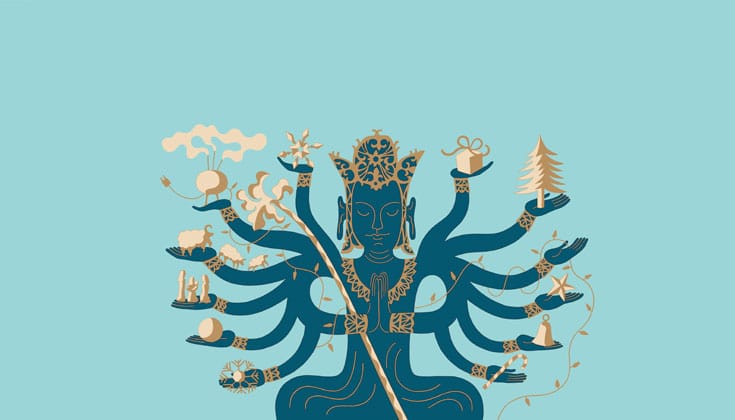One Perfect Christmas
Bonnie Nadzam on letting go of holiday expectations, and simply enjoying the mystery and tradition of the season.
I was raised Catholic and once, as a girl, I had The Perfect Christmas. The snow was hip deep, the dining room table piled high with painted sugar cookies, the light of the Savior shone in our hearts at midnight Mass, and the presents were stacked to our shoulders around the perfect, hyper-perfect, super-perfect tree.
I’ve only had one Perfect Christmas. Last Christmas, I was pregnant, on bed rest, and slept through most of the day. The Christmas before, my father was dying, I was preparing for surgery, and we were all quarrelling with each other. The year before that, I don’t even remember.
I do recall the year my sister tried so hard to re-create that erstwhile perfect day for her daughter that her daughter stopped opening presents halfway through, started crying, and refused to open any more. I also recall the Christmas my immediate family, for some reason, watched the entire Chucky horror-film series. It was the longest we’d all shared the same space together in years, and it’s a day we all look back on with odd fondness and gratitude.
Tradition is a more mystifying and powerful container than we give it space for during the holidays. The truth is, I don’t know what this year’s Christmas will be like. That’s not to say we won’t prepare for it, or try to align our hearts with the mysteries of the season (such a powerful time: Hanukkah, Bodhi Day, the Feast of the Immaculate Conception, Christmas Day, the solstice, etc.). But we won’t be steering for anything in particular. It’s a mystery, after all. That’s what we hope to be attentive enough to witness.
Bonnie Nadzam’s most recent novel is Lions. She’s a student in the White Plum Asanga and the mother of twin boys.
How I Discovered the Meaning of Christmas
The point of Christmas, says Lama Rod Owens, is to be in the places that need you.
When I was growing up, Christmas was always a special time for me. My mother and I didn’t have a lot, but she, with the help of my father, made sure I had what I needed and wanted. After college, I struggled to understand what Christmas meant beyond materialism and consumption. I wanted to remember how the season evolved out of commemorating the birth of Jesus, and how that event signaled, above all, new hope, transformation, and resilience.
By my early twenties, I was living in an intentional community in Boston called Haley House, where one of our projects was running a soup kitchen that mostly served homeless men. My first Christmas staffing the kitchen was also the first time I’d been away from my family during Christmas. It felt odd.
It was the tradition for a family close to the Haley House community to come in on Christmas morning to prepare and offer a breakfast of ham and eggs to about a hundred men. I felt moved by the generosity of this family. As the men came in, I felt my own longing to be somewhere else, as they too may have wished to be somewhere else. But we were there together, and I realized we were holding space for each other to practice hope and resilience.
That morning I reflected on my choice to serve, and in doing so understood that this was the point of Christmas: to be in the places that need you. This was a transformation for me. I finally knew what Christmas meant to me.
Lama Rod Owens is a core teacher with the Natural Dharma Fellowship in Cambridge and a co-author of Radical Dharma.
“Thank Buddha”
Ira Sukrungruang reflects on what Christmas meant to his younger self.
On Christmas, my mother played Bing Crosby and Pat Boone throughout the house, their baritone voices reverberating holiday cheer. She sat by the bay windows and hummed and watched winter howl outside. Above her sat a gold Buddha, his eyes breaking from a pleasant dream.
My father strung lights around the entirety of the house, enjoying his respite from the textile factory.
Christmas was not a Christian holiday. It wasn’t an American one. For my Thai family, 8,000 miles from home, Christmas was our holiday. I didn’t know it didn’t belong to us displaced Buddhists on the gritty southside of the city. I only knew that the voices of Bing and Pat gave my mother joy. I only knew the care and precision my father took in making our house the brightest on the block. I only knew that when dinner came, we gorged ourselves on basil chicken, green curry, roasted meats from a Chinatown that never closed, and steaming bowls of jasmine rice.
“What a good day,” my father would say.
“Thank Buddha,” my mother would say.
“Merry Christmas,” I would say, looking toward the fireplace in hopes of a fat man emerging with presents.
Ira Sukrungruang is the author of the memoir Southside
Buddhist and the poetry collection In Thailand It Is Night.
An Ordinary Miracle
As a Buddhist, Kate Johnson views the holiday season as a magical time to love each other more.
Although I am a Buddhist, I still participate in many of the rituals of Christmas—buying and decorating a tree, visiting family and friends, searching for meaningful gifts, donating money and time to folks who have less than I do, spending hours making dishes that are consumed in a matter of minutes.
During the holiday season, I love taking night walks to look at the decorations illuminating windows and doors and lawns. These gifts of beauty are freely offered for passersby to enjoy. I love to cuddle with loved ones while watching the holiday movies that we relentlessly make fun of but watch every year.
As a dedicated dharma practitioner, my beliefs have changed, but my longing for unconditional love and a fresh start for humanity have not. I still see Christmas as a time to celebrate the shared wish for a better world. It seems like we all want peace and for everyone to be safe and fed. Yet we have all contributed to a system in which these things seem impossible, and that truth is breaking our hearts.
At Christmastime, though, believers and others seem a little more willing to try to love each other, to welcome the stranger, to share what we have, and to slow down enough to appreciate our blessings. This is a kind of magic, an ordinary miracle that is absolutely worth celebrating.
Kate Johnson can often be found at the intersection of meditation, art, and activism—teaching, writing, and occasionally dancing around.
Houses Full of Light
Mary Rose O’Reilly shares a collection of gathas for the Christmas season.
In my childhood, the adults made music and cocktails until it was time for somebody’s crying jag. Later, we headed to midnight Mass. My dad, a glorious tenor, always found his moment to stand on the front steps and sing “O Holy Night.”
Later, as a single mother, I kept the season with Quaker restraint. The children would wake to banks of candles in blue glass and a few homemade gifts. Then we served dinner at the Catholic Worker.
Grown up, my children confided, “That was not magical.”
Last Christmas Eve, I chose the sesshin of an overnight train journey. If I nodded off, a toilet door would slam its call to mindfulness: May all beings be brought to enlightenment.
At dawn, outside the train window, there was a snow-swept mountain gorge as if by the Japanese artist Hokusai. My children met me at the station and took me away to houses full of light.
Gathas for Christmas
Advent
In this season of holy longing, with the help of all beings, may I rest in the equanimity of practice.
Solstice
As the days become shorter and darkness deepens, may I honor the rhythm of rest and gestation the earth teaches me.
Shopping
May I walk mindfully amid distraction, attraction, neediness, and panic, remembering that peace is every step.
Giving a gift
In this season of high expectations, may I lovingly offer what is truly needed.
Visiting and welcoming
In this season of hospitality, may I seek that of God in all encounters.
Lighting a candle
I honor the wisdom of my ancestors and teachers. With the help of all beings, I vow to open my heart to illumination.
Mary Rose O’Reilly is the author of The Love of Impermanent Things.
A Time to Perfect Our Compassion
Gift giving is a physical enactment of the principle of compassion, says Buddhist monk Bhante Suddhaso.
The Buddhist monk Ajahn Chah said, “Anything that inspires us to see what is true and do what is good is proper practice.”
Christmas is an excellent example of this. At first glance, it may appear to be non-Buddhist, but on closer examination we see that it provides an opportunity to practice several aspects of the Buddhist path: generosity, consideration, kindness, and mutual regard.
In particular, the practice of gift giving is a physical enactment of the principle of compassion. This is especially relevant when we recall that our actions arise directly from our mind states: the perfection of compassion as a mind state naturally manifests as physical acts of kindness and generosity. If we find that we do not readily act for the well-being of others, that indicates there is a need for further development of inner compassion. That can be developed by giving gifts to others.
Bhante Suddhaso is a Buddhist monk in the Thai Forest Tradition. He lives in New York City
“We’re Celebrationists”
Rachel Neumann uses Christmas as a celebratory day to notice bravery, honor darkness, and celebrate light.
I remember my first Christmas present. One December morning, on the California commune where I grew up, the grownups dressed up like a green dragon. A man crouched inside the huge papier-mâché head while others were the body, cavorting to the sound of a drum.
We children were encouraged to line up and, one by one, put a hand in the dragon’s gaping mouth. My desire for a present warred with my fear of those giant jaws. I closed my eyes, stretched out my arm, and pulled out a small homemade train. My fingers closed tightly around the rough wood, proud to have something I’d earned with my bravery.”
Now, as an adult, I spend Christmas with my family. We bring in the potted blue spruce, add twinkling lights, and spend the afternoon with Chinese food and a movie in homage to my immigrant Jewish ancestors. We are “celebrationists,” my children say, and the day is an opportunity, amid the constant hubbub, to notice our bravery, honor the darkness, and celebrate the light.
Rachel Neumann is the publisher and editorial director of Parallax Press and the author of Not Quite Nirvana.






